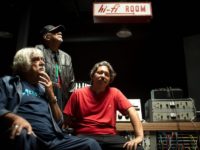I remember Azymuth back in the eighties as this funky little jazz fusion trio from Brazil whose sound approximated Weather Report but with some hot samba thrown in for local flavoring. The Cascades LP I had back then got a fair amount of spins and these guys were all better-than-average musicians that kept their arrangements lean, tidy and organically funky. Those aren’t attributes you could say about many fusion outfits of that era.
I kind of lost track of them since then, assuming that they eventually broke up, but the same three guys are still at it today and on October 21, Butterfly dropped. It comes four years after their prior release but the long wait between releases isn’t the reason to get fired up about Butterfly. Rather, it’s the consistent quality of the record itself.
The first thing that struck me about Butterfly is how true the band has stayed to the style they’ve developed more than 25 years ago. At first I thought I was listening to a recording that old, with it’s lack of compressed, modern touches. For some bands, this might be draw accusations of being stuck in a rut, but for Azymuth, it’s sticking to what they do best, and no one has ever quite replicated their blend of Brazilian samba and American funk-jazz, anyway. There’s only one place you can get that kind of fusion music, folks.
Even as the synths of keyboardist José Roberto Bertrami are vintage, they are tastefully inserted throughout. He even whips out a vocoder for a couple of tunes, and enough time has passed since it was en vogue to pass that off as “old school.”
Alex Malheiros, meanwhile, has the same crisp, loping bass lines that he’s always been known for, and Ivan Conti’s drums and percussion is the perfect blend of American funk and Brazilian rhythms; it’s Conti’s wide array of Latin and African beats that more than anything else gives Azymuth distinction over so many other fusion bands out there, especially compared to the acid jazz groups of today.
For this outing, Azymuth added some light orchestral backing in spots. Introducing strings to jazz grooves can usually bog things down, but Arthur Verocai’s arrangements on “New Dawn” and the title cut are done so impeccably and tactfully, they serve to enhance those songs, instead.
Even without the strings added in spots, the band changes things up on each tune to make each one sound distinctive, sometimes adding guest players to insert the right extra instrument. And so, Malheiros’ eulogy to his late son, “Meu Doce Amigo,” is graced by the flute of Ze Carlos, or Verocai will add guitar to cuts like the funky strut of “Avenida Rio Ranco” (where Bertrami adds a soul slab of Hammond B-3 to compete with his cozy Rhodes).
Ultimately, though, it’s the confident, ultra-tight rhythm section of Malheiros and Conti the drive funky numbers like the perfectly syncopated “Os Cara La.” On “Triagem” they demonstrate how Brazilian beats can be so simultaneously complex and compelling. “Caititu” delves even further into primal rhythms but in a wide-appealing way. Even on the gentler songs such as “New Dawn” and “Morning” (see video below), the grooving doesn’t stop, it’s just slowed down and full of sweet, sticky soul.
While all the originals—mostly written by Bertrami—are catchy yet still giving the guys a little room to show their acumen, the one non-cover is a well chosen one: Herbie Hancock’s track from 1974’s Thrust, “Butterfly.” It’s the prettiest melody from Hancock’s Head Hunters era, and not overly covered. Azymuth’s version sounds even more organic than the original, as Bertrami dispenses with the ARP and sticks just to electric piano. There’s none of the five-minute solo turns here, either, as the group prefers here to just let that lovely melody become the main focus. Bertrami does provide a brief but effective solo that pays homage to Herbie’s pioneering Rhodes style, however.
Butterfly, like all Azymuth records, don’t seek to challenge your ears to a test of tolerance but it’s far too meaty to be pigeon-holed as smooth jazz, either. For chilling out with some integrity, it often strikes the right balance: twenty-five years ago, and as I have discovered, even today.
- Tobias Meinhart – ‘Sonic River’ (2025) - April 22, 2025
- Ivo Perelman, with William Parker + Rashied Ali – ‘Sad Life’ (1996, 2025 reissue) - April 15, 2025
- Nels Cline – ‘Consentrik Quartet’ (2025) - March 31, 2025



